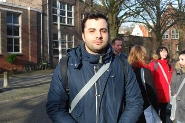
‘Be open to other cultures’
This week more than 400 international students are starting their study programme in Leiden or The Hague. Why did they choose to study here? And what is the advice from their mentors?
62 nationalities
These 400 students represent no fewer than 62 different nationalities. In the Orientation Week from 26 to 29 January they will get to know their study programme, the city and one another. In her welcome speech Vice-Rector Simone Buitendijk advised them to be open to other cultures and not to believe that there is only one right way. The university is a good place to learn that and the input from international students is very welcome. According to Buitendijk, complex global problems such as the issue of asylum seekers can only be handled effectively if they are approached from different perspectives
Emrah Karadogan (Denmark, Crisis and Security Management)
‘The Crisis and Security Management programme in The Hague seems a good choice in these turbulent times. I am concerned about the many crises we are facing, such as the terrorist attacks and the refugee issue. This programme teaches you how to handle these problems. Not only that, the programme also gives you good prospects on the job market, because if there’s one thing you can be sure of, it’s that there will always be crises. I also like the fact that The Hague is so international. My family is Kurdish and we lived in Turkey, but moved to Denmark, so I feel at home in an international environment where lots of people from different countries come together.’
Michaela Brier-Mills (Australia, Public International Law)
‘Leiden’s beautiful city centre is like a kind of wonderland for me. It’s completely different from the modern cities that I’m used to in Australia. And it’s a real advantage that Leiden is so close to The Hague, where all the international courts are located. That’s the world I want to work in later. I chose Public International Law because of its broad scope: from governance in Western countries and developing regions to human rights. And you can get some good practice here with the intensive moot court programme. There’s also a personal reason for me to be here. My grandmother is Dutch and before this week I had never been in the Netherlands. It’s fantastic to finally meet my Dutch family and get to know them better.’
Mentor Alexander Verdoes (the Netherlands, Political Science)
‘Last year I was an exchange student myself in Norway and I really appreciated that the Norwegian students organised an introduction for us. That made me decide to help international students back home, because I know how important a good start is. My advice is to be very active in the first few weeks and get to know as many people as possible. This is the time when everyone is extra open for one another, so make good use of it. International students and Dutch students don’t automatically integrate. As a Dutch mentor, I try to give that integration a kick start. It would be really good if the different groups mixed more.’ ’
Mentor Selena Escandell (the Netherlands, Law)
‘My family is Spanish, but I have lived my whole life in the Netherlands. Last year I was an Erasmus student in Spain and I like the idea of being part of an international group again. Leiden is such a compact city, you soon feel at home. It’s easier to meet up with one another and you’ll always come across someone you know when you’re out in the city. But you do have to make some effort yourself and I tell my group not to stay indoors, but to get out and about. I also tell them not to pay too much attention to a person’s nationality; that’s not what’s important. The main thing is that you get along well together.’
(LvP/Photography: Maaike de Jong)
